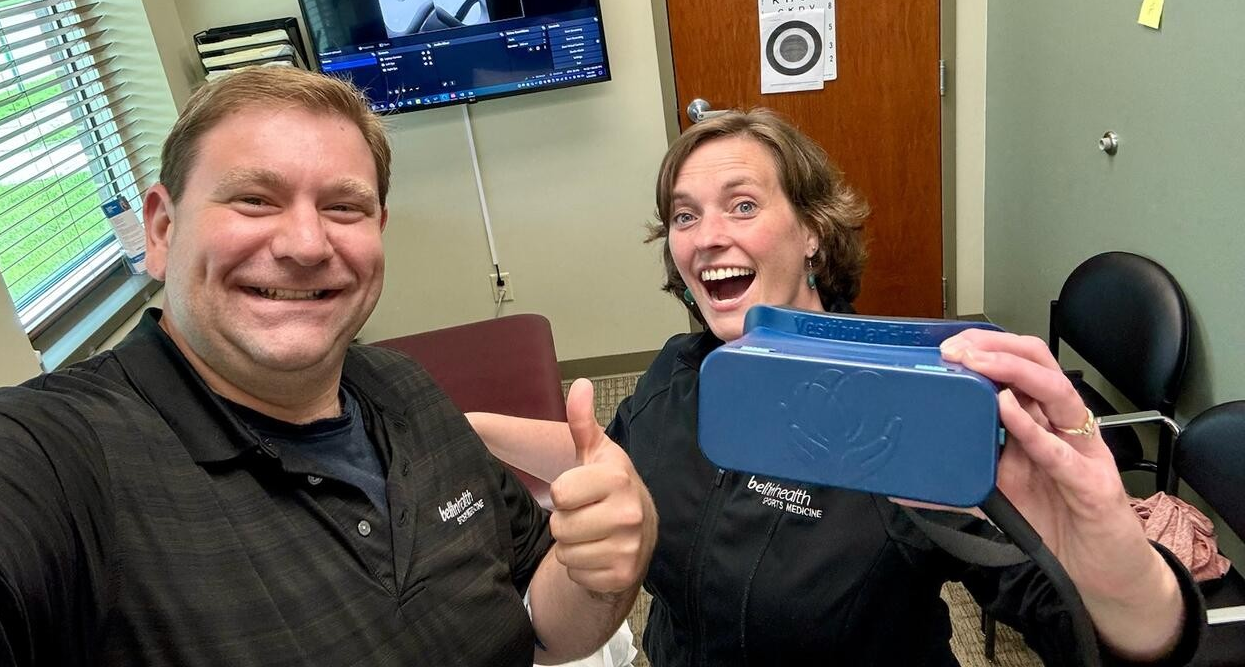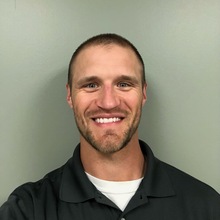The world needs more vestibular therapists!
Dizziness affects 15-20% of individuals, adding up to 7.5 million people. The incidence of dizziness increases with age, along with the risk of injury associated with dizziness and falls.
There are many causes of dizziness:
- vestibular system (inner ear)
- heart
- central nervous system (brain)
- vision problems
- neuropathy
- neurodegenerative diseases
- anxiety
- nutrition and hydration
- migraine
- cervical spine (neck)
Physical therapists and occupational therapists are trained in differential diagnosis, determining the root cause of a patient's symptoms and determining if vestibular rehab is appropriate or if the patient's condition requires the skills of another specialist. Physical therapists my provide vestibular rehab services in an outpatient clinic, inpatient hospitals, home health setting, urgent care or emergency department.
The vestibular system works in coordination with the visual system and with the muscles, joints, and musculoskeletal system to understand the body's position in and movement through space. When one of these systems is not functioning properly, the result is dizziness, imbalance and falls. The job of a vestibular therapist is to investigate. To assess each of these systems and determine what is causing the problem. Is it a sensory problem affecting the ear, eyes, or musculoskeletal system? Is it an integration problem affecting the brain's ability to process the information? Is it a motor control problem with the function of the nerves, joints, muscles? And just what do we do about it to help the patient feel better?
Examination
Vestibular therapists will use tools, such as infrared videogoggles, an eye occluder, a reflex hammer, tuning fork, balance pad.
The following systems should be assessed:
- Eyes: quality of movement and ability to coordinate the eyes
- Vestibular system: how the body responds to head movement and positional changes
- Brain and nerves: coordination of the extremities, sensation, motor control, postural stability
- Cervical spine: cervical spine for mobility, strength and joint position awareness
- Balance: standing balance, challenging balance by closing the eyes, moving feet together or one in front of the other, walking and turning the head, bending, reaching



Vestibular Rehabilitation
Vestibular rehabilitation may consist of repositioning maneuvers if the crystals of the inner ear have been displaced, causing positional vertigo. It may include movements to improve coordination of the head and eyes, to improve balance on various surfaces and in different environments. Balance challenges may include sitting, standing, bending, turning, throwing and catching, turning the head while maintaining balance, balancing while performing other motor or cognitive tasks. Vestibular therapists may use tools such as a laser positioned on the head to improve awareness of the head position in space, or videos moving through different environments to challenge the eyes and ears to work together.



Live Courses
-

Vestibular Rehab Certificate for Clinicians - Nashua, NH
BundleThis hybrid vestibular rehab bundle incorporates instructor feedback on assessment and treatment techniques, nystagmus videos, video case studies, and group discussions to improve management of patients with vestibular disorders.
$795
-

Vestibular Rehab Certificate for Clinicians - Carroll University, Waukesha, WI October 4-5, 2025
BundleThis hybrid vestibular rehab course incorporates instructor feedback to improve your treatment techniques, group discussions and case studies to better understand the function and pathophysiology of the peripheral and central vestibular systems. You'
$795
Instructors

Colleen Sleik PT, DPT, NCS, GCS
Physical Therapist

Jack Cervantes PT, DPT, OCS
Physical Therapist

Zac Mestelle PT, DPT, OCS
Physical Therapist
Great course
Tracy Winnie
I thought this course work was very thorough. I enjoyed the charts to make information easier to assimilate and I felt the written material was and will continue to be a helpful reference tool.
I thought this course work was very thorough. I enjoyed the charts to make information easier to assimilate and I felt the written material was and will continue to be a helpful reference tool.
Read LessUncomfortable to Confident
Jade Schwalbe
I’d taken another vestibular certification course that left me with more questions than answers. I searched for a course that had some in-person component and found this one, and I am so glad I did. I went from dreading these cases to feeling conf...
Read MoreI’d taken another vestibular certification course that left me with more questions than answers. I searched for a course that had some in-person component and found this one, and I am so glad I did. I went from dreading these cases to feeling confident in my tools as an outpatient clinician with only Frenzel lenses. The course information was broken down into sections by diagnosis that made so much sense. The exam and findings were taught excellently and explained for clinical use so well. I can’t thank Colleen and Jack enough for putting things together in such an organized and complete way without it being overwhelming or confusing. The content you get and the community also really set this course apart from anything else I have done. Thank you so much!!
Read LessVery clear and applicable
Christie Norman
Excellent course, very clear and applicable.
Excellent course, very clear and applicable.
Read LessGreat preparation
Rachelle Schroeder
The course materials were great preparation for the skills lab. Colleen was thorough in her instruction and did repetitions to help reinforce the new information. It was a great class
The course materials were great preparation for the skills lab. Colleen was thorough in her instruction and did repetitions to help reinforce the new information. It was a great class
Read LessUncomfortable to Confident
Jade Schwalbe
I’d taken another vestibular certification course that left me with more questions than answers. I searched for a course that had some in-person component and found this one, and I am so glad I did. I went from dreading these cases to feeling conf...
Read MoreI’d taken another vestibular certification course that left me with more questions than answers. I searched for a course that had some in-person component and found this one, and I am so glad I did. I went from dreading these cases to feeling confident in my tools as an outpatient clinician with only Frenzel lenses. The course information was broken down into sections by diagnosis that made so much sense. The exam and findings were taught excellently and explained for clinical use so well. I can’t thank Colleen and Jack enough for putting things together in such an organized and complete way without it being overwhelming or confusing. The content you get and the community also really set this course apart from anything else I have done. Thank you so much!!
Read LessExcellent course
Meghan Jantzi
excellent
excellent
Read LessExcellent course
Amy Roby
This course was very thorough! I found the content, video examples, and case studies extremely helpful for application.
This course was very thorough! I found the content, video examples, and case studies extremely helpful for application.
Read LessInformative
Jeremiah Zook
I feel like this course has been beneficial in my professional practice/treatment
I feel like this course has been beneficial in my professional practice/treatment
Read LessOnline Courses
-

Current Concepts in Concussion Management: A Strategic Approach to Rehab
CourseSpecialists in physical therapy, neuro-optometry, and neuropsychology set the foundation for concussion management from a multi-disciplinary perspective, covering the clinical domains and offering many clinical pearls along the way!
Purchase$299
-

Vestibular 101: Basic Clinical Competency
Course5.0 average rating (1 review)This course was created to help organizations develop a baseline vestibular competency for staff to ensure competency in assessment and treatment of basic vestibular diagnoses.
$75
-

Vestibular Rehab Certificate for Clinicians Part 1: Foundation
Course5.0 average rating (9 reviews)This self-paced, online course in vestibular rehabilitation breaks down complex concepts in a logical progression. Topics include anatomy, vestibular pathology, assessment, differential diagnosis and treatment, concluding with case study analysis.
$299
Guest Instructors
Dr. Theis and Dr. Peterson are guest instructors for Current Concepts in Concussion Management, offering a unique perspective as experts in neuro-optometry and neuropsychology.

Jacqueline Theis OD, FAAO, FNAP
Optometrist trained in Neuro-Optometry

Jesse Peterson PsyD
Neuropsychologist
Mentoring
-
Pre-order available now!

Vestibular Specialist: Education and Small Group Mentoring
CourseThis program consists of an initial 1:1 assessment with the instructor to determine your goals for the program and create an action plan, hybrid course, bi-monthly virtual meetings, and regular text and email communication with your instructor.
Pre-order now




